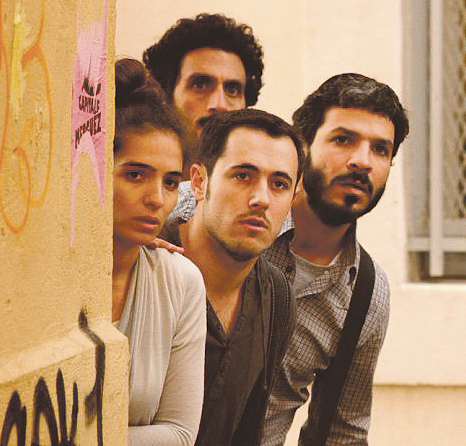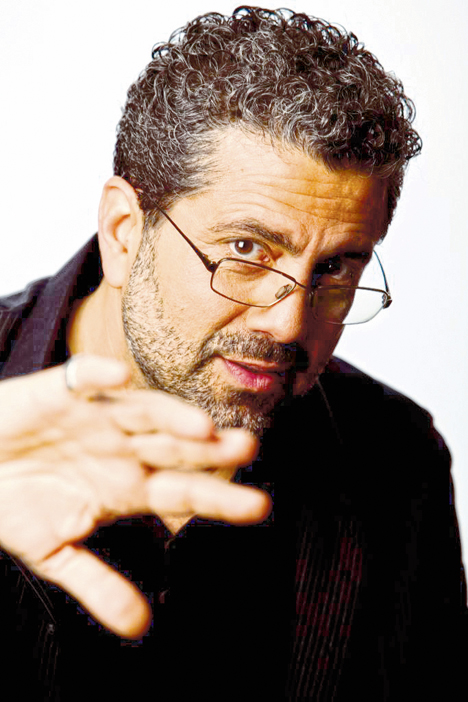Israeli filmmaker’s Kind Words tracks siblings’ journey through the past

By Michael Fox, Special To The Dayton Jewish Observer
The Kind Words could be described as an exceptionally touching comedy or an unusually funny family drama. Israeli writer-director Shemi Zarhin won’t argue either way.
“I write like a director and I direct like a novelist,” he says via Skype from his home in Israel. “What interests me the most is the way that ambiguity creates an emotional experience. The most important thing is that there are several moments that you don’t know how to feel. The characters themselves don’t know if they should laugh or cry.”
The feature film presents three Thirtysomething siblings with the revelation that their mother’s first sweetheart in her native Algeria was a Muslim, and might be their biological father. Already grappling with individual personal troubles, Dorona, Netanel and Shai set off to Paris (and beyond) to try and find him.
Dorona has separated from her husband after a couple of miscarriages, and questions herself and the relationship. Shai, the youngest, is gay and insists on keeping his family at arm’s length.
 Netanel, meanwhile, became observant after he married an American Orthodox Jew, but is unresolved about his faith and beliefs. However, that doesn’t stop him from criticizing’s Shai’s sexual orientation. You can imagine his reaction to the notion that he might be the son of a Muslim.
Netanel, meanwhile, became observant after he married an American Orthodox Jew, but is unresolved about his faith and beliefs. However, that doesn’t stop him from criticizing’s Shai’s sexual orientation. You can imagine his reaction to the notion that he might be the son of a Muslim.
While the premise of the film is serious and the stakes are high, there’s ample opportunity for scathing one-liners, absurdist situations, curious behavior and poignant encounters.
The Kind Words, which received 12 Ophir Award nominations, screens on the JCC Film Fest.
“My goal was to take Dorona step by step to the moment that she can understand that she has to understand, like Alice in Wonderland,” the 55-year-old director says. “At the end of the story she is in the right state of mind to start asking the real questions.”
The identity of her biological father, which set Dorona on this journey, turns out not to be the most important question. Zarhin underscores that point with an ending that avoids confirming whether the siblings have located the right man.
“Dorona realizes that the father is the one that wants to be a father,” Zarhin says forcefully. “The mother is the one that wants to be a mother. The Israeli is the one that wants to be Israeli. And (the) Jewish (one) is the one that wants to be Jewish.”
Zarhin argues that in order to live a satisfying life, his characters must decide who they are rather than accepting and conforming to roles that have been imposed on them as individuals, or members of a family, nationality or country.
“From my point of view, the present and the future are the space that we should live in,” Zarhin says. “The past is a kind of jail, a prison. Until we understand that, we are, in a way, slaves of our past, or our parents’ past.”

When Dorona begins to see things through someone’s eyes other than her own, she develops compassion for her mother as well as the only father she’s known. The Kind Words represents a kind of humanist filmmaking in the tradition of the great films of Jean Renoir and Satyajit Ray.
One of Israel’s most respected filmmakers, Zarhin previously directed Passover Fever (1995), Dangerous Acts (1998, seven Ophir Awards), the massive international hit Bonjour Monsieur Shlomi (2003), Aviva, My Love (2006, six Ophir Awards) and The World is Funny (2012, 15 Ophir nods).
He is also the author of the prizewinning, bestselling 2012 novel, Some Day.
“When you ask me what is my profession, I say storyteller,” Zarhin says. “A storyteller is not a plot teller. It’s not only the plot. It’s a story, which has feelings and images and ideas.”
The JCC Film Fest presents The Kind Words at 7:15 p.m. on Thursday, May 4 at The Neon, 130 E. 5th St., Dayton. Tickets are available at the door, at jewishdayton.org, at the Boonshoft CJCE, 525 Versailles Dr., Centerville, or by calling Karen Steiger at 610-1555.
To read the complete April 2017 Dayton Jewish Observer, click here.

